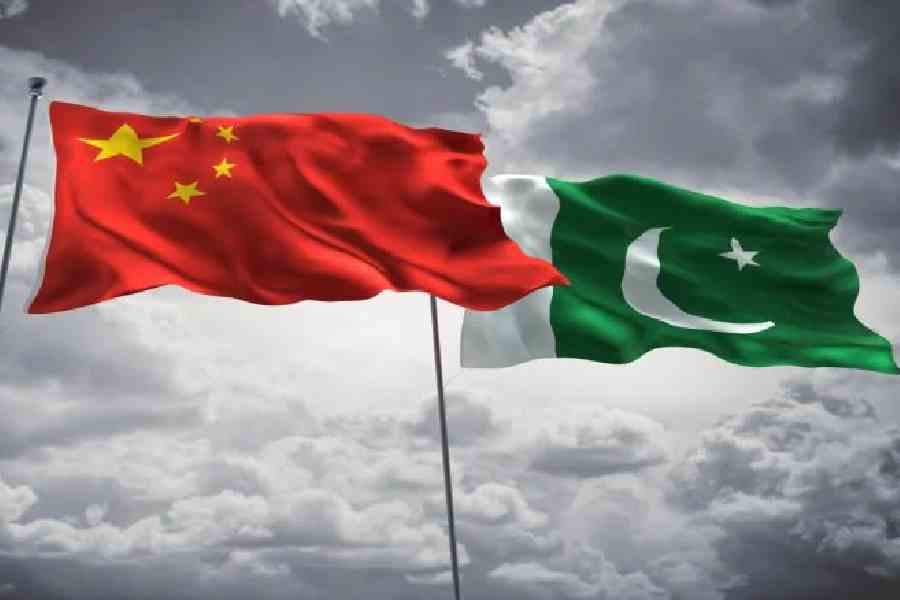China has refused to further expand cooperation in the areas of energy, water management, and climate change under the multi-billion dollar China-Pakistan Economic Corridor (CPEC), it emerged on Tuesday, signalling a strain in the 'ironclad' friendship between the two all-weather allies.
Cash-strapped Pakistan also gave up its opposition to setting up a new imported coal-fired power plant in Gwadar in Balochistan province and agreed to a number of Chinese demands to address Beijing’s concerns, The Express Tribune newspaper reported, citing the signed minutes of the 11th Joint Cooperation Committee (JCC) of the CPEC.
The JCC is a strategic decision-making body of the CPEC and its 11th meeting was held virtually on October 27 last year on the insistence of the Pakistan Muslim League-Nawaz (PML-N)-led government that wanted to showcase some progress.
However, the minutes of the meeting were signed almost a year later on July 31 during the visit of Chinese vice premier He Lifeng, highlighting the difference of opinions on both sides that led to such a huge delay in reaching a consensus, the report said.
When contacted, the Ministry of Planning stated that it was a global practice for the minutes of meetings between two countries to be signed by both sides only after due consultation and evolving consensus.
Interestingly, the final draft shared with Beijing by Pakistan and the final minutes signed by both sides were different in many ways, the report said.
China's disagreement to further expand cooperation in areas of energy, water management, and climate change under the CPEC underscores "the challenges that both the sides are facing in deepening the economic ties", it said.
The USD 60 billion CPEC, which connects Gwadar Port in Pakistan's Balochistan with China's Xinjiang province, is the flagship project of China's ambitious multi-billion-dollar Belt and Road Initiative (BRI). The BRI is seen as an attempt by China to further its influence abroad with infrastructure projects funded by Chinese investments all over the world.
The CPEC is a collection of infrastructure and other projects under construction throughout Pakistan since 2013. India has protested to China over the CPEC as it is being laid through Pakistan-occupied Kashmir (PoK).
The details of the final minutes of the 11th JCC showed that China did not agree to a host of measures that Pakistan had proposed in the areas of energy, water management, climate change and tourism in Gilgit-Baltistan, Khyber-Pakhtunkhwa, PoK and the coastal areas.
China excluded cooperation in the areas of cross-border tourism in Gilgit-Baltistan, Khyber-Pakhtunkhwa, PoK and cooperation for the promotion of coastal tourism from the final minutes, the details showed.
China also did not agree to Pakistan’s proposal for the inclusion of Water Resources Management and Climate Change and Urban Infrastructure Development in the CPEC framework. The proposal for setting up a new joint working group on water resources management and climate change was also rejected by China.
China excluded the issue of financial challenges being faced by the power companies from the final minutes.
Beijing also did not agree to a proposal to include a 500kv transmission line from Hub to Gwadar to link the seaport city with the national grid in the CPEC framework.
China did not agree to “carry out joint studies for future development of Thar coal blocks, including development of mega power parks and power evacuation infrastructure, with a view to meet Pakistan’s energy needs from indigenous resources, conversion of coal into other products for domestic demand as well as exports", the report said.
Similarly, there is no mention of the South-North gas pipeline project in the final minutes. The draft minutes mentioned the examination of a feasibility study and Chinese cooperation for the purpose.
Pakistan had proposed Chinese participation in a strategic underground gas storage project but there is no mention of this mega project in the final minutes.
Islamabad had also proposed the participation of China in the national seismic study for sedimentary areas and sought Chinese equipment. But this idea is also shelved at the bilateral level.
Pakistan proposed joint exploration, development, and marketing of metallic minerals and sought Chinese technology, but the final minutes were silent on this issue too, according to the Express Tribune report.
China also did not agree to Pakistan's proposal of developing a policy framework for coal gasification to fertiliser projects based on Thar coal.
Meanwhile, Pakistan has given significant concessions to China on the issue of setting up the 300MW Gwadar Power Plant.
Islamabad wanted to either shelve the 300MW project or change its location to Thar to use the local coal. However, China did not agree to it, the report said.
Pakistan also wanted the conversion of the imported fuel-based Gwadar plant to Thar coal to address energy security and liquidity issues to which China did not agree.
Pakistan also committed that it would follow the consensus reached by two sides, and will direct the Pakistani power purchase companies to stop deducting the capacity power rate and return the deducted power rate.
To ensure the normal operations of CPEC power projects, the Pakistani side promised to take necessary measures to ensure timely exchange to US dollars for CPEC power projects to buy necessary fuels, the report said.
Except for the headline, this story has not been edited by The Telegraph Online staff and has been published from a syndicated feed.










